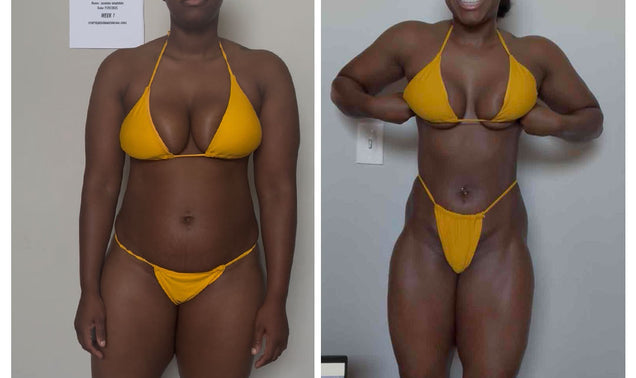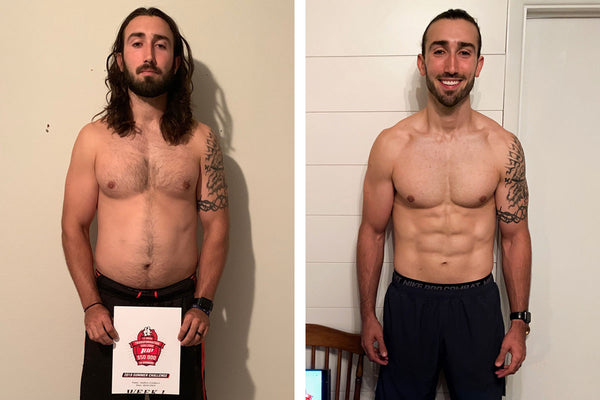Losing weight is a goal for many of the individuals entering our transformation challenge.
If you’ve tried dieting before, you’ve likely experienced some success, but have you ever wondered if it’s possible to get even better results from your diet and exercise plan?
Here, we present 8 things you can do starting today to help maximize your weight loss!
#1 Track Calories
At its core, losing, gaining, or maintaining body weight boils down to calories in versus calories out.
If you are eating more calories than you burn each day, then you will gain weight.
Conversely, if you are eating fewer calories than you burn each day, then you will gain weight.
And, if you eat roughly the same number of calories as you burn each day, then your weight will stay about the same.
The only way to know whether you are consuming too few or too many calories is to first get an estimate for how many calories you need to eat each day for your goals. To help figure that out, click here.
Once you have an idea of how many calories you should be eating, you then need to start tracking your calories by logging the foods you eat.
While this might sound tedious, thanks to 1UP Transformation Diet Program Calorie Tracker (2nd page of your diet program) tracking calories has never been easier. No longer do you have to create a spreadsheet or keep a pad of paper around to write down every morsel of food you eat.
#2 Eat Enough Protein
Anytime you diet for fat loss, you place your muscles at risk for breakdown. The reason for this is that muscle tissue is the most metabolically active and energy-demanding tissue in the body.
As such, when you are dieting, calories are at a premium, and since the body will seek to sustain life above all else when facing energy deprivation, it will be prone to eliminate those structures which are not absolutely essential to survival.
Since muscle is so calorically “expensive”, the body will be tempted to break it down for energy in order to satisfy its needs.
To prevent this from happening, there are a few things you can do.
The first of which is to consume enough protein.
Consuming enough protein ensures your body has enough amino acids to repair the damage done to your muscles from training as well as fend off the possibility for catabolism (protein breakdown).
Current recommendations for protein intake when dieting is between 1-1.2 grams per pound.[1,2]
This means if you weigh 130 lbs, then you will want to consume between 130-156 grams of protein per day to ward off muscle loss when dieting.
Consuming this amount of protein may seem daunting to individuals who are not used to consuming high protein diets. If you struggle to consume enough protein each day, 1UP Nutrition makes a number of high-quality protein powders that are low in calories and high in protein, making them a perfect addition to any fat loss diet.
#3 Prioritize Sleep
Diet and exercise are frequently stressed to those seeking weight loss, and make no mistake they are absolutely vital to successfully shedding unwanted body fat.
However, one pillar of physique transformation that’s not emphasized nearly enough is sleep.
Getting enough sleep (7-9 hours) per night is critical.
When you are sleep deprived, your energy, focus, and motivation all decline. This means your ability to push hard in your workouts and burn more calories takes a hit. You may not even have the motivation to go to the gym at all following a night of poor sleep.
Not getting adequate sleep also impacts your hormone levels to a considerable degree. Just one night of poor sleep is enough to reduce insulin sensitivity and fat burning while increasing cortisol and stress.
As if that’s not bad enough, poor sleep also affects hunger and satiety cues. When you don’t sleep enough, leptin (the satiety hormone) decreases and ghrelin (a hunger hormone) increases.[3,4]
This means that not only do you feel less satisfied with the meals you eat, but you’re also more likely to overeat the day after a poor night of sleep.
If you struggle to get to sleep each night, try one or more of the following options:
- Reducing blue light exposure (laptops, smartphones, tablets, tv, etc) 2 hours before bed
- Institute a bedtime ritual to cue your body that it’s time to “power down” for the evening
- Avoid reading stressful text messages or emails and scrolling through social media
- Have a cup of chamomile tea an hour before bed
You can also try using a sleep and recovery aid such as 1UP Recharge PM Burner or Beauty Dream PM Metabolic Support.
#4 Lift Weights
For decades it was thought that in order to effectively lose weight you have to starve yourself and perform endless hours of steady-state cardio.
Truth be told, this will have you lose weight, but not the right type of weight. In addition to losing some body fat, you’ll also lose a fair amount of lean muscle.
You see when you restrict your calories too severely and add to it for hours and hours of jogging, running, cycling, etc. you place tremendous stress on your body, which increases levels of a catabolic hormone called cortisol.
When cortisol levels are chronically elevated, the body is prone to break down muscle tissue and actually promote fat storage -- exactly what you don’t want to happen when trying to lose fat.
For these reasons, when dieting for fat loss, the first thing to focus on is maintaining a calorie deficit, which is driven primarily by your diet.
The second thing you need to focus on is resistance training, i.e. lifting heavy weights.
Unlike excessive bouts of cardio, lifting weights actually helps your body hold onto lean muscle mass when dieting. And if you’ve never performed much resistance training before, you may actually be able to build muscle while burning fat.
The more muscle you retain while dieting, the higher your metabolic rate will be which means you can diet on a higher number of calories.
#5 Hydrate
Whenever you’re dieting for fat loss (or really any time in general), your beverage of choice should be water.
It contains zero calories but is essential to optimal function, performance, and fat loss.
Research from 2014 found that when overweight individuals consumed 500mL of water 30 minutes before each meal, they ate fewer calories during the day and experienced greater weight loss than the group who did not consume an extra glass of water before each meal.[5]
Drinking more water also helps displace other calorie-containing liquids from the diet, such as soda, fruit juice, or gourmet coffees.
As we said before, when you are dieting, calories are at a premium, which means you don’t have the room in your diet to “waste” calories on micronutrient-void sugary drinks. Furthermore, these calorie-laden drinks also do little to fill you up and may actually make you hungrier.
Finally, consuming enough water also helps you perform and recover from your workouts.
If you struggle to drink enough water throughout the day, try carrying a water bottle with you wherever you go and remember to drink from it throughout the day.
#6 Cardio
Cardio can be a very useful tool to assist you in creating the energy deficit needed to facilitate weight loss.
However, cardio should not be the primary means you undertake to create that calorie deficit. By and large, the amount of calories burned from a 30 minute bout of cardio is a drop in the bucket compared to what your body burns the rest of the day. This makes cardio rather inefficient and ineffective as the primary driver of fat loss.
But, that doesn’t mean cardio is not needed.
Provided that you already have your nutrition plan lined out and you are already lifting weights, cardio should be added into your daily training plan to increase your daily energy expenditure and be used in lieu of having to further reduce your calories.
#7 Carb Cycle
This next tip is for the more advanced dieters out there.
For the vast majority of people looking to drop a few pounds and tighten up around the midsection, simply adhering to your diet plan and lifting weights will be all you will need.
Carb cycling is an advanced nutritional strategy for experienced dieters looking to get “stage level” lean.
The way carb cycling works is that you alternate between high-carb days and low-carb days.
The goal of the high-carb days is to help replenish glycogen as well as to prevent the body’s metabolism from adapting to a low-calorie diet.
Typically, individuals have two non-consecutive high-carb days per week. The high carb days are usually placed on the days of your most demanding workouts (legs and back for instance) or on the days immediately preceding your hardest workouts so that your energy stores are full and you can crush your workouts.
For more information on carb cycling, click here.
#8 Supplement with a Premium Quality Fat Burner
Last, but not least, individuals looking to take maximize fat loss and take their results to heights unseen can invest in a high-quality fat burner.
1UP Nutrition has created a formidable arsenal of premium fat burning supplements and thermogenics to help make dieting easier than ever.
Our stimulant-based fat burners Pro Ripped Max and Make Her Lean Max include powerful thermogenic agents such as Lean GBB™ and Paradoxine® which help boost metabolism, fat burning, and calorie burning.
If hunger is what is most challenging for you when dieting, we also make a non-stimulant Appetite Suppressant which can help reduce cravings and may help avoid going on a snacking binge.
Finally, we also make a pair of nighttime sleep aids/fat burners in Recharge PM Burner and Beauty Dream PM Metabolic Support that not only help improve sleep quality but also support the body’s natural fat burning processes overnight.
Takeaway
Successfully losing weight doesn’t have to be complicated, frustrating, or painful.
Use the pointers above to dial in your training and nutrition to make losing fat easier than ever and get the results you’ve always wanted!
References
- Helms ER, Aragon AA, Fitschen PJ. Evidence-based recommendations for natural bodybuilding contest preparation: nutrition and supplementation. J Int Soc Sports Nutr. 2014;11:20. Published 2014 May 12. doi:10.1186/1550-2783-11-20
- Chappell AJ, Simper T, Helms E. Nutritional strategies of British professional and amateur natural bodybuilders during competition preparation. J Int Soc Sports Nutr. 2019;16(1):35. Published 2019 Aug 22. doi:10.1186/s12970-019-0302-y
- Taheri S, Lin L, Austin D, Young T, Mignot E. Short sleep duration is associated with reduced leptin, elevated ghrelin, and increased body mass index. PLoS Med. 2004;1(3):e62. doi:10.1371/journal.pmed.0010062
- SCHMID, SEBASTIAN M., et al. "A single night of sleep deprivation increases ghrelin levels and feelings of hunger in normal-weight healthy men." Journal of Sleep Research, vol. 17, no. 3, 2008, pp. 331-334.
- Vij VA, Joshi AS. Effect of excessive water intake on body weight, body mass index, body fat, and appetite of overweight female participants. J Nat Sci Biol Med. 2014;5(2):340–344. doi:10.4103/0976-9668.136180






